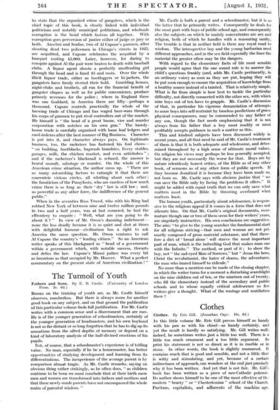The Turmoil of Youth
Booxs on the training of youth are, as Mr. Castle himself observes, numberless. But there is always room for another good book on any subject, and on that ground the publication of this particular volume finds full justification. For Mr. Castle .writes with a common sense and a discernment that are rare. He is of the younger generation of schoolmasters, certainly of the younger generation of headmasters, and his own boyhood is not so far distant or so long forgotten that he has to dig up its sensations from the silted depths of memory or depend on a kind of laboratory analysis of the half-divined emotions of his pupils.
Not, of course, that a schoolmaster's experience is of trifling value. No man, especially if he be a housemaster, has better opportunities of studying development and learning from its differentiations. The inexperience of the average parent is by comparison almost tragic. As Mr. Castle remarks, saying an obvious thing rather strikingly, as he often does, " as children continue to be born we must conclude that at their birth mere men and women are transformed into fathers and mothers and that these newly-made parents have not encompassed the whole realm of parental wisdom. " Mr. Castle is both a parent and a schoolmaster, but it is as the latter that he primarily writes. Consequently he deals for the most part with boys of public school age, and consequently also the subjects on which he mainly concentrates are sex and religion, both of which he handles with a reassuring sanity.
The trouble is that in neither field is there any royal road to wisdom. The introspective boy and the young barbarian need different approaches, and in the sex field especially the finer the material the greater often may be the dangers.
With regard to the elementary facts of life most sensible people would agree that the one sound rule is to answer the child's questions frankly (and, adds Mr. Castle pertinently, in an ordinary voice) as soon as they are put, hoping they will be put soon enough to ensure the acquisition of knowledge from a healthy source instead of a tainted. That is relatively simple. What is far from simple is how best to tackle the particular difficulty, not directly connected with the other sex, with which nine boys out of ten have to grapple. Mr. Castle's discussion of that, in particular his vigorous denunciation of attempts to scare boys into self-restraint by baseless predictions of grave physical consequences, may be commended to any father of any son, though the fact needs emphasizing that it is not always from his father that a boy most readily or most profitably accepts guidance in such a matter as this.
This and kindred subjects have been discussed widely in recent years, and all that need be said of Mr. Castle's treatment of them is that it is both adequate and wholesome, and deter- mined throughout by a high sense of ultimate moral values. On religion his views may perhaps be less generally accepted, but they are not necessarily the worse for that. Boys are by nature relentlessly honest critics, of the Bible as of any other book, of sermons as of any other form of public speech. If they become Jesuitical it is because they have been made so, not born so. Mr. Castle says with obvious justice that " we can save the Bible only by facing the problems it offers." It might be added with equal truth that we can only save what matters most in the Bible by throwing overboard what matters least.
The human youth, particularly about adolescence, is respon- sive to the religious appeal if it comes in a form that does not alienate him. On that Mr. Castle's original documents, over- mature though one or two of them seem for their writers' years, are singularly instructive. His own conclusions are suggestive. The aim: "to give to the young searcher the fundamental start for all religious striving—that men and woman are not pri- marily composed of gross material substance, and that there- fore a diet of ' bread alone ' will starve the most important part of man, which is the indwelling God that makes man one with the Infinite." The method, or part of it ; to show the boy, not the sad-eyed Man of Sorrows," but " Jesus the hero, Christ the revolutionist, the hater of shams, the adventurer, the man who inured himself to ridicule."
No more than a mention can be made of the closing chapter, in which the writer turns for a moment a disturbing searchlight on the nine children out of ten, or the nineteen out of twenty, who fill the elementary instead of the secondary and public schools and to whose equally critical adolescence so few writers give a thought. What of the wastage and mutilation there ?


































 Previous page
Previous page